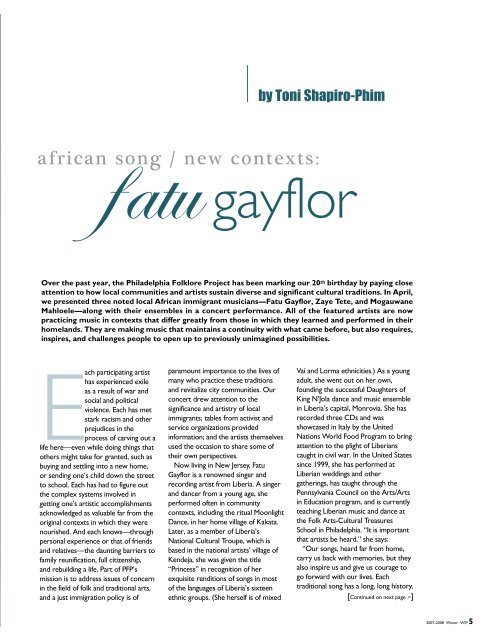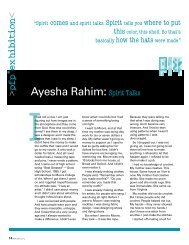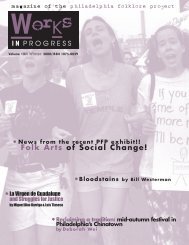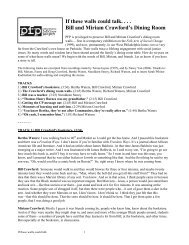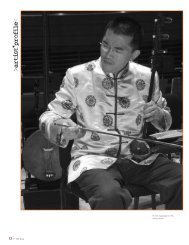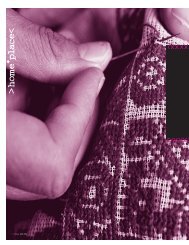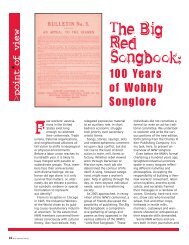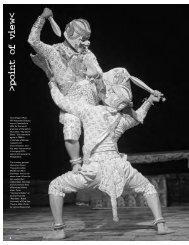African song / Fatu Gayflor ⢠War and wealth - Philadelphia Folklore ...
African song / Fatu Gayflor ⢠War and wealth - Philadelphia Folklore ...
African song / Fatu Gayflor ⢠War and wealth - Philadelphia Folklore ...
Create successful ePaper yourself
Turn your PDF publications into a flip-book with our unique Google optimized e-Paper software.
y Toni Shapiro-Phim<br />
fatu gayflor<br />
african <strong>song</strong> / new contexts:<br />
Over the past year, the <strong>Philadelphia</strong> <strong>Folklore</strong> Project has been marking our 20 th birthday by paying close<br />
attention to how local communities <strong>and</strong> artists sustain diverse <strong>and</strong> significant cultural traditions. In April,<br />
we presented three noted local <strong>African</strong> immigrant musicians—<strong>Fatu</strong> <strong>Gayflor</strong>, Zaye Tete, <strong>and</strong> Mogauwane<br />
Mahloele—along with their ensembles in a concert performance. All of the featured artists are now<br />
practicing music in contexts that differ greatly from those in which they learned <strong>and</strong> performed in their<br />
homel<strong>and</strong>s. They are making music that maintains a continuity with what came before, but also requires,<br />
inspires, <strong>and</strong> challenges people to open up to previously unimagined possibilities.<br />
Each participating artist<br />
has experienced exile<br />
as a result of war <strong>and</strong><br />
social <strong>and</strong> political<br />
violence. Each has met<br />
stark racism <strong>and</strong> other<br />
prejudices in the<br />
process of carving out a<br />
life here—even while doing things that<br />
others might take for granted, such as<br />
buying <strong>and</strong> settling into a new home,<br />
or sending one’s child down the street<br />
to school. Each has had to figure out<br />
the complex systems involved in<br />
getting one’s artistic accomplishments<br />
acknowledged as valuable far from the<br />
original contexts in which they were<br />
nourished. And each knows—through<br />
personal experience or that of friends<br />
<strong>and</strong> relatives—the daunting barriers to<br />
family reunification, full citizenship,<br />
<strong>and</strong> rebuilding a life. Part of PFP’s<br />
mission is to address issues of concern<br />
in the field of folk <strong>and</strong> traditional arts,<br />
<strong>and</strong> a just immigration policy is of<br />
paramount importance to the lives of<br />
many who practice these traditions<br />
<strong>and</strong> revitalize city communities. Our<br />
concert drew attention to the<br />
significance <strong>and</strong> artistry of local<br />
immigrants; tables from activist <strong>and</strong><br />
service organizations provided<br />
information; <strong>and</strong> the artists themselves<br />
used the occasion to share some of<br />
their own perspectives.<br />
Now living in New Jersey, <strong>Fatu</strong><br />
<strong>Gayflor</strong> is a renowned singer <strong>and</strong><br />
recording artist from Liberia. A singer<br />
<strong>and</strong> dancer from a young age, she<br />
performed often in community<br />
contexts, including the ritual Moonlight<br />
Dance, in her home village of Kakata.<br />
Later, as a member of Liberia’s<br />
National Cultural Troupe, which is<br />
based in the national artists’ village of<br />
Kendeja, she was given the title<br />
“Princess” in recognition of her<br />
exquisite renditions of <strong>song</strong>s in most<br />
of the languages of Liberia’s sixteen<br />
ethnic groups. (She herself is of mixed<br />
Vai <strong>and</strong> Lorma ethnicities.) As a young<br />
adult, she went out on her own,<br />
founding the successful Daughters of<br />
King N’Jola dance <strong>and</strong> music ensemble<br />
in Liberia’s capital, Monrovia. She has<br />
recorded three CDs <strong>and</strong> was<br />
showcased in Italy by the United<br />
Nations World Food Program to bring<br />
attention to the plight of Liberians<br />
caught in civil war. In the United States<br />
since 1999, she has performed at<br />
Liberian weddings <strong>and</strong> other<br />
gatherings, has taught through the<br />
Pennsylvania Council on the Arts/Arts<br />
in Education program, <strong>and</strong> is currently<br />
teaching Liberian music <strong>and</strong> dance at<br />
the Folk Arts-Cultural Treasures<br />
School in <strong>Philadelphia</strong>. “It is important<br />
that artists be heard,” she says:<br />
“Our <strong>song</strong>s, heard far from home,<br />
carry us back with memories, but they<br />
also inspire us <strong>and</strong> give us courage to<br />
go forward with our lives. Each<br />
traditional <strong>song</strong> has a long, long history,<br />
[Continued on next page >]<br />
2007-2008 Winter WIP 5


